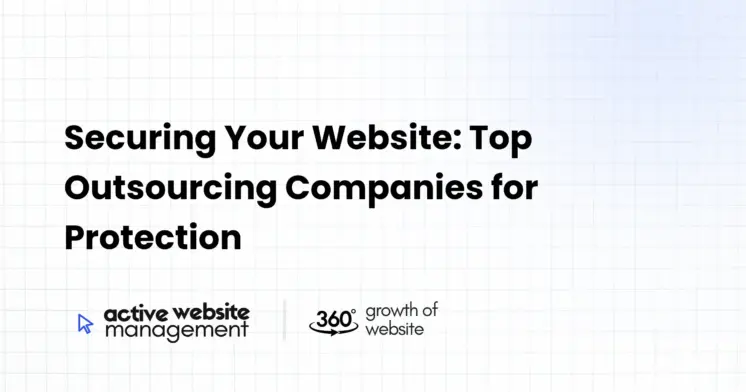January 9, 2025
9 min read
In today’s digital age, websites have become the cornerstone of business operations, personal projects, and social connections. However, with the increase in online activity, websites are more susceptible to cyber-attacks, malware, data breaches, and hacking attempts. Ensuring the security of your website is paramount to safeguarding your data, maintaining the trust of your visitors, and protecting your brand’s reputation.
While some businesses have in-house IT teams to handle website security, many others rely on outsourcing to experienced professionals. Outsourcing website security allows companies to benefit from specialized expertise without the need for a full-time, in-house team. In this article, we will explore the top outsourcing companies for website protection and how their services can help keep your website secure.
Why Outsource Website Security?
Before diving into the list of top outsourcing companies for website security, it’s important to understand why many businesses prefer outsourcing over handling website protection in-house.
1. Cost-Effectiveness
Hiring a full-time in-house security team can be expensive. From salaries to training and ongoing overhead costs, maintaining an internal security department can be a significant financial burden. Outsourcing website security to a specialized company offers access to top-tier expertise at a fraction of the cost.
2. Access to Expertise
Website security is a constantly evolving field. Cyber threats are becoming more sophisticated every day, and staying ahead of the curve requires expertise in various security technologies, threat detection, and incident response. Outsourcing to a dedicated security firm provides access to professionals who are well-versed in the latest security trends and solutions.
Don’t Just Maintain Your Website—
Grow It using Active Website Management! Don't Wait for Growth—Accelerate It with Active Website Management
3. Focus on Core Business
Outsourcing website security allows businesses to focus on what they do best. Instead of dedicating time and resources to monitoring security, businesses can leave that to the experts and concentrate on their core competencies, whether that’s product development, marketing, or customer service.
4. Proactive Monitoring and Protection
Website security firms not only protect your site against existing threats but also proactively monitor for potential vulnerabilities. This means that they are constantly scanning your website for any signs of malicious activity, ensuring that problems are identified and resolved before they can cause significant harm.
5. Disaster Recovery and Incident Response
In the unfortunate event that your website is breached or compromised, having an outsourced security provider ensures that you have a plan in place for swift recovery. Many security firms offer disaster recovery and incident response services, which can help minimize downtime and data loss.
Top Outsourcing Companies for Website Security
Now that we’ve established why outsourcing website security is a wise decision, let’s take a look at some of the top outsourcing companies that specialize in website protection.
1. Sucuri
Overview:Sucuri is a leading name in the website security industry. The company offers a comprehensive suite of security services, including malware removal, firewall protection, and continuous monitoring. Sucuri is known for its ability to handle security issues swiftly and efficiently.
Key Features:
- Website Firewall Protection: Sucuri’s Web Application Firewall (WAF) helps protect websites from various online threats like DDoS attacks, malware, and brute-force attacks.
- Malware Removal & Cleanup: Sucuri offers real-time malware removal and cleanup services to ensure your site stays protected.
- 24/7 Security Monitoring: Sucuri provides continuous security monitoring to detect any potential vulnerabilities or threats.
Why Choose Sucuri? Sucuri has an excellent reputation for website security and is trusted by thousands of websites around the world. Their proactive monitoring system and fast malware removal services make them one of the best options for businesses looking to secure their websites.
2. SiteLock
Overview:SiteLock is another leading provider of website security services. They offer a wide range of tools designed to prevent malware, hacking, and other online threats. SiteLock is well-known for its automated website security solutions, which make it easier for website owners to stay protected.
Key Features:
- Website Malware Removal: SiteLock can remove malware and malicious code from your website quickly and efficiently.
- Website Security Monitoring: SiteLock continuously scans your website for vulnerabilities and malware.
- DDoS Protection: The company offers Distributed Denial of Service (DDoS) protection to keep your site online even during an attack.
- PCI Compliance Assistance: SiteLock helps ensure that your website is compliant with PCI standards for eCommerce security.
Why Choose SiteLock? SiteLock is perfect for businesses looking for an affordable yet powerful security solution. Their automated services, coupled with excellent customer support, make it a great option for companies of all sizes.
3. Cloudflare
Overview:Cloudflare is one of the most recognized names in website security and performance. While the company is primarily known for its content delivery network (CDN), it also offers robust website security solutions, including DDoS protection, firewall services, and SSL encryption.
Key Features:
- DDoS Protection: Cloudflare’s advanced DDoS protection system can mitigate attacks before they even reach your website.
- Web Application Firewall (WAF): Cloudflare’s WAF offers protection against malicious bots, SQL injection, cross-site scripting, and other threats.
- SSL/TLS Encryption: Cloudflare provides easy SSL certificate management to encrypt communication between the website and its visitors.
Why Choose Cloudflare? Cloudflare’s security services are highly effective, and they are known for their scalability, making them suitable for businesses of all sizes. Their free tier also offers basic protection, which is a great starting point for small businesses and startups.
4. Wordfence
Overview: Wordfence is a popular website security provider specifically for WordPress sites. It’s one of the most comprehensive security plugins available, offering a range of features to protect WordPress websites from hackers and malware.
Key Features:
- Firewall Protection: Wordfence offers a powerful firewall that filters out malicious traffic.
- Malware Scan & Removal: The plugin scans for malware and attempts to remove it as soon as it’s detected.
- Login Security: Wordfence offers two-factor authentication and CAPTCHA to protect user login pages.
- Real-Time Threat Defense: The plugin provides real-time blocking of malicious traffic and protects against brute-force attacks.
Why Choose Wordfence? Wordfence is an excellent choice for businesses using WordPress. It is user-friendly and provides robust protection for WordPress websites. The plugin also offers a free version, making it accessible for small businesses on a budget.
5. Kaspersky
Overview:Kaspersky is a globally recognized cybersecurity firm known for its anti-virus software. However, the company also offers website security solutions, including protection against malware, phishing attacks, and ransomware.
Key Features:
- Website Malware Removal: Kaspersky can quickly detect and remove any malware that may have infected your website.
- Anti-Phishing Protection: The company provides anti-phishing tools to safeguard your website from phishing attacks.
- Ransomware Protection: Kaspersky helps protect your site from ransomware attacks that can lock down your website and hold it hostage.
Why Choose Kaspersky? Kaspersky’s long history and reputation for providing top-notch security services make it a reliable option for businesses seeking comprehensive website protection. Their cybersecurity solutions offer a multi-layered approach, making it difficult for hackers to breach your site.
Don't Wait for Growth—Accelerate It with
Active Website Management Don't Wait for Growth—Accelerate It with Active Website Management
6. Active Website Management (AWM)
Overview:Active Website Management (AWM) is a leading provider of website maintenance and security services. They specialize in keeping websites secure, fast, and up to date. AWM’s approach includes proactive monitoring, malware scanning, and performance optimization, making it a one-stop solution for businesses looking for robust website protection.
Key Features:
- Proactive Security Monitoring: AWM provides continuous monitoring for malware, vulnerabilities, and other security threats.
- Website Backups and Disaster Recovery: They offer regular website backups and disaster recovery services to protect your site from data loss.
- Performance Optimization: AWM ensures that your website remains fast and responsive, reducing the risk of security issues caused by slow performance.
- SSL Setup and Configuration: They help configure SSL certificates for encrypted communication between your website and users.
Why Choose AWM? AWM stands out for its customer-first approach and personalized service. They work closely with clients to tailor security solutions that meet their specific needs. Whether you run an e-commerce site, a corporate website, or a blog, AWM offers robust, scalable security options.
Best Practices for Outsourcing Website Security
When choosing an outsourcing company for your website security, it’s important to consider several factors to ensure you are partnering with the right provider.
1. Do Your Research
Before selecting a security provider, take the time to read reviews, case studies, and testimonials. Research the company’s track record, their experience with businesses similar to yours, and their overall reputation in the industry.
2. Understand the Services Offered
Different security providers offer different services. Ensure that the provider you choose offers comprehensive services, such as malware detection, firewall protection, and disaster recovery. Tailor your security package to meet your specific needs.
3. Look for Proactive Monitoring
Choose a provider that offers proactive monitoring to detect threats before they cause harm. Real-time threat detection is crucial for minimizing security risks.
4. Verify Compliance Standards
If you operate in a regulated industry, ensure that the security provider meets all necessary compliance requirements (e.g., PCI DSS for e-commerce websites). This will help protect sensitive customer data and avoid legal issues.
5. Review Response Time
In the event of a security breach or attack, it’s important that your security provider responds quickly. Look for providers that offer 24/7 customer support and fast incident response times.
Conclusion
Securing your website is no longer optional—it’s a necessity. By outsourcing website security to trusted providers, you can ensure that your site remains safe from the growing array of cyber threats. The companies listed above offer robust security services that can help you protect your website, your data, and your customers.
Whether you’re looking for malware removal, firewall protection, or proactive monitoring, these outsourcing companies provide the expertise and tools needed to secure your online presence effectively. Don’t wait until a cyberattack occurs—take the necessary steps to protect your website today.




